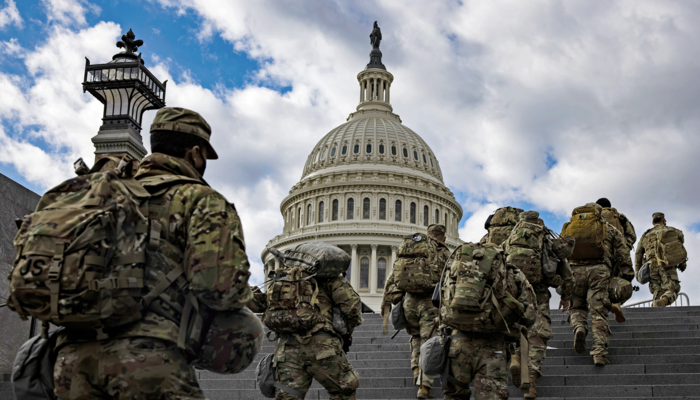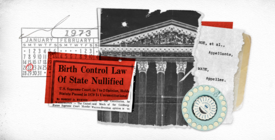The Posse Comitatus Act bars federal troops from participating in civilian law enforcement except when expressly authorized by law. This nearly 150-year-old law embodies an American tradition that sees military interference in civilian affairs as a threat to both democracy and personal liberty. However, recent events have revealed dangerous gaps in the law’s coverage that Congress must address.
More on Domestic Deployment of the Military >>
What does the term “posse comitatus” mean?
In British and American law, a posse comitatus is a group of people who are mobilized by the sheriff to suppress lawlessness in the county. In any classic Western film, when a lawman gathers a “posse” to pursue the outlaws, they are forming a posse comitatus. The Posse Comitatus Act is so named because one of the things it prohibits is using soldiers rather than civilians as a posse comitatus.
What are the origins of the Posse Comitatus Act?
The Posse Comitatus Act was passed in 1878, after the end of Reconstruction and the return of white supremacists to political power in both southern states and Congress. Through the law, Congress sought to ensure that the federal military would not be used to intervene in the establishment of Jim Crow in the former Confederacy.
Despite the ignominious origins of the law itself, the broader principle that the military should not be allowed to interfere in the affairs of civilian government is a core American value. It finds expression in the Constitution’s division of power over the military between Congress and the president, and in the guarantees of the Third, Fourth, Fifth, and Sixth Amendments, which were in part reactions to abuses committed by the British army against American colonists.
Today, the Posse Comitatus Act operates as an extension of these constitutional safeguards. Moreover, there are statutory exceptions to the law that allow the president to use the military to suppress genuine rebellions and to enforce federal civil rights laws.
What does the Posse Comitatus Act say?
The Posse Comitatus Act consists of just one sentence: “Whoever, except in cases and under circumstances expressly authorized by the Constitution or Act of Congress, willfully uses any part of the Army, the Navy, the Marine Corps, the Air Force, or the Space Force as a posse comitatus or otherwise to execute the laws shall be fined under this title or imprisoned not more than two years, or both.”
In practice, this means that members of the military who are subject to the law may not participate in civilian law enforcement unless doing so is expressly authorized by a statute or the Constitution.
Are all members of the military covered by the Posse Comitatus Act?
No, only federal military personnel are covered. The Coast Guard, though part of the federal armed forces, has express statutory authority to perform law enforcement and is not bound by the Posse Comitatus Act.
Members of the National Guard are rarely covered by the Posse Comitatus Act because they usually report to their state or territory’s governor. That means they are free to participate in law enforcement if doing so is consistent with state law. However, when Guard personnel are called into federal service, or “federalized,” they become part of the federal armed forces, which means they are bound by the Posse Comitatus Act until they are returned to state control.
What are the main statutory exceptions to the Posse Comitatus Act?
There are many statutory exceptions to the Posse Comitatus Act, but the most important one is the Insurrection Act. Under this law, in response to a state government’s request, the president may deploy the military to suppress an insurrection in that state. In addition, the Insurrection Act allows the president — with or without the state government’s consent — to use the military to enforce federal law or suppress a rebellion against federal authority in a state, or to protect a group of people’s civil rights when the state government is unable or unwilling to do so.
What are the constitutional exceptions to the Posse Comitatus Act?
There are no constitutional exceptions to the Posse Comitatus Act. The law allows only for express exceptions, and no part of the Constitution expressly empowers the president to use the military to execute the law. This conclusion is consistent with the law’s legislative history, which suggests that its drafters chose to include the language about constitutional exceptions as part of a face-saving political compromise, not because they believed any existed.
This has not stopped the federal government from claiming that constitutional exceptions to the law exist. The Department of Defense has long claimed that the Constitution implicitly gives military commanders “emergency authority” to unilaterally use federal troops “to quell large-scale, unexpected civil disturbances” when doing so is “necessary” and prior authorization by the president is impossible. The validity of this claimed authority has never been tested in court.
In the past, the Department of Defense also claimed an inherent constitutional power to use the military to protect federal property and functions when local governments could not or would not do so. The regulation asserting this authority was repealed in 2018, but the Trump administration recently raised the argument again in court, arguing that this so-called “protective power” provided legal authority for the administration’s use of federalized National Guard troops and Marines in Los Angeles. In that case, a federal judge ruled that the deployment there violated Posse Comitatus Act and ordered the Trump administration to end it.
What are the weak points in the Posse Comitatus Act?
The first and most obvious weakness in the Posse Comitatus Act is that there are too many statutory exceptions that collectively sweep far too broadly. Including the Insurrection Act, a total of 26 distinct statutes expressly authorize the military to execute the law in one circumstance or another. Many of these are outdated and unnecessary in the 21st century.
Events in recent years have also highlighted two loopholes in the Posse Comitatus Act, both of which concern the National Guard. The first involves the District of Columbia National Guard. Unlike all other state and territorial National Guards, the DC Guard is always under presidential control. Despite this, the Department of Justice has for years asserted that the DC Guard can operate in a non-federal, “militia” status, in which it is not covered by the Posse Comitatus Act. By this interpretation, presidents can use the DC Guard for law enforcement whenever they choose. President Trump has exploited this loophole twice, both in the summer of 2020 during his first term and through the ongoing deployment of the DC Guard that began in August 2025.
The second loophole in the Posse Comitatus Act arises from the law that allows the National Guard to operate in “Title 32 status.” Under this status — a middle ground between purely state operations and federalization — Guard personnel are paid with federal funds and may perform missions requested by the president, but they remain under state command and control. That means they are not subject to the Posse Comitatus Act, even though they are serving federal interests. The first and second Trump administrations similarly exploited this loophole to bring out-of-state National Guard personnel into DC in the summer of 2020 and as part of the ongoing deployment there.
The Posse Comitatus Act is also plagued by ambiguity originating from two main sources. First, what qualifies as “law enforcement” under the law is not always apparent. The statute itself offers no definition. After a series of court decisions in the 1970s served only to muddy the waters, Congress stepped in to authorize specific kinds of indirect military support to law enforcement while prohibiting activities that courts and the executive branch have deemed “core” law enforcement functions, such as executing warrants and making arrests. But whether these laws should be viewed as statutory exceptions to the Posse Comitatus Act or as falling outside the law’s prohibition because they do not permit direct participation in those core law enforcement activities is itself a source of ambiguity. Moreover, permitting a wide range of activities characterized as indirect “support to law enforcement,” as opposed to direct “participation in law enforcement,” has made military involvement in civilian law enforcement in certain areas, especially at the U.S.–Mexico border, routine.
Second, the Posse Comitatus Act’s reference to potential constitutional exceptions — even though, as noted above, nothing in the text of the Constitution suggests that there are any such exceptions — creates unnecessary ambiguity as to the scope of the president’s authority, and invites dubious assertions of inherent powers like those the Trump administration has put forward in California’s lawsuit challenging deployment around LA.
How should the Posse Comitatus Act be reformed?
The Brennan Center has proposed a set of comprehensive reforms to the Posse Comitatus Act and related laws. First, Congress should rein in the law’s statutory exceptions. The most important step in this process will be reforming the Insurrection Act, which the Brennan Center has likewise published a comprehensive reform proposal for. Congress also should eliminate outdated and unnecessary exceptions, such as the one concerning federal timber in Florida, the one concerning unlawful enclosures on public lands, and the one concerning guano islands.
Second, Congress should extend the Posse Comitatus Act to cover federally requested deployments of the National Guard in Title 32 status. In virtually all respects save command and control, these missions resemble the federal military operations that the Posse Comitatus Act was designed to restrict, and they should not lie outside its scope. Congress also should either extend the law’s coverage to include the District of Columbia National Guard, currently under the control of the president, or transfer control from the president to the mayor of Washington except when the Guard is federalized.
Third, Congress should eliminate the Posse Comitatus Act’s reference to constitutional exceptions, which serves only to create unnecessary and potentially dangerous ambiguity as to the scope of the president’s authority.
Fourth, Congress should abolish the amorphous distinction between direct “participation in law enforcement” and indirect “support to law enforcement.” Instead, the Posse Comitatus Act should explicitly cover the military’s engagement in, participation in, or direct or indirect support to law enforcement activities.
Finally, Congress should address the Posse Comitatus Act’s lack of meaningful enforcement mechanisms. To do so, Congress should provide for an exclusionary rule that bars the introduction in criminal prosecutions of evidence obtained through any violation of the Posse Comitatus Act. Congress should also create a private cause of action that would allow individuals who have been injured by a violation of the Posse Comitatus Act to sue for damages. People who are harmed by soldiers acting as police in violation of the law should be compensated for their injuries.







